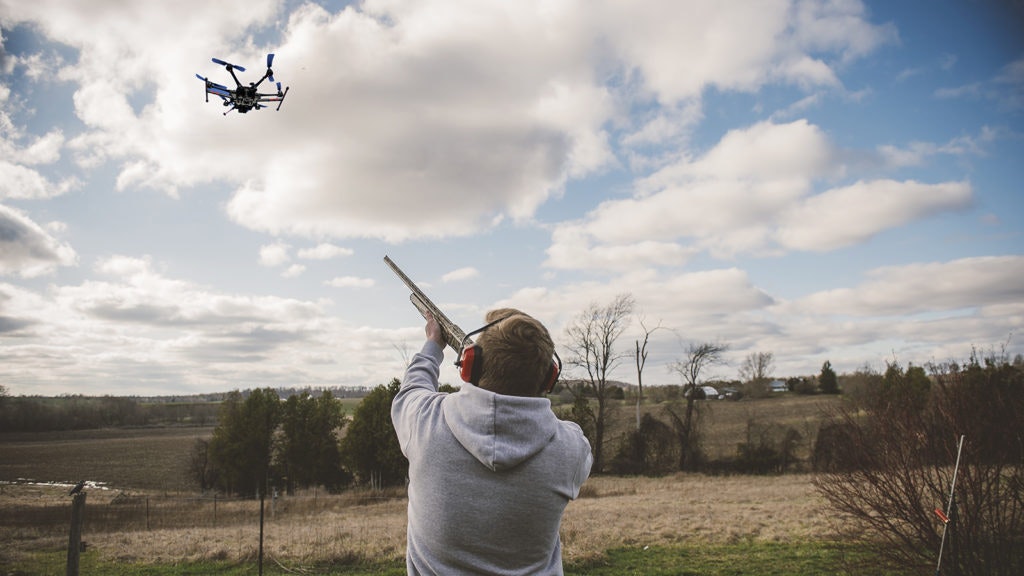RJ Pieper of Rock Springs is a professional photographer who frequently uses drones, who says he understands that not everybody is always happy when his aerial devices buzz overhead.
Testifying before the Wyoming House Judiciary Committee on Friday, he recalled being out on a jobsite with his drone near a bowling alley in Green River when a neighboring resident came storming out of her house.
“She was immediately angry,” he told the committee. “She said, ‘You’re pissing my dogs off.’”
The woman then threatened to turn her dogs loose on him if he didn’t immediately land the drone and leave, Pieper said.
He was among several commercial drone pilots who testified against Senate File 34, which would criminally charge intrusive drone pilots with trespass. Under the bill, violators could be sentenced to up to six months in jail and fined $750.
Split Vote
SF 34 passed the Wyoming Senate before moving to the House Judiciary Committee, which voted 7-2 Friday to not give the bill a “do pass” recommendation as it moves on to the full House.
Committee Chairman Rep. Art Washut, R-Casper, voted against the recommending the bill, as did Reps. Ken Chestek, D-Laramie; Jeremy Haroldson, R-Wheatland; Mark Jennings, R-Sheridan; Tony Niemiec R-Green River; Karlee Provenza, D-Laramie; and Rachel Rodriguez-Williams, R-Cody.
Reps. Barry Crago, R-Buffalo, and Ember Oakley, R-Riverton, voted in favor of it.
Business Interests Would Suffer, Pilots Say
The bill needs an exception for certified government and business drone pilots, Pieper and others said.
And as it stands, the bill doesn’t make a distinction between a pilot who might inadvertently stray over private property and somebody who is maliciously trying to harass or spy on a landowner, they claimed.
Pieper said 15% to 20% of his business revenue comes from drone photography, and “it’s dang near impossible” to meet his clients’ orders without at least passing over neighboring properties.
Video producer Ali Grossman of Laramie said footage from drones is vital for promoting Wyoming’s tourism industry.
“Our vistas would not be possible to shoot unless we fly over some private land spaces,” she said. “There’s a difference between hovering over somebody’s property and just going through airspace.
Under SF 34, “I could be jailed when really all I’m trying to do is just add to the economy of this state,” she added.
Aerial Ogling?
Pieper said people might sometimes get the impression that a drone is being used to spy on them when in fact the pilot has the aircraft’s cameras pointed in another direction.
Washut replied that doesn’t mean a drone still can’t make people feel uncomfortable.
“I guess that if a drone is hovering over my daughter while she’s at the swimming pool – whether the camera is pointed at her or not – I’m going to find that a disturbing circumstance, and that’s what we’re trying to get at here,” he said.
Pieper and others said that existing statues against invasion of privacy or stalking could be used to file charges against people deliberately being creepy with drones.
Privacy Most Important
Crago pushed back against some of the testimony, saying the bill’s intent is to protect privacy, not punish businesses.
“That’s my question to all of the drone pilots and I’m just going to start asking it. When do the individual people of Wyoming have a right to privacy?” he said. “I mean that’s what we’re really talking about here.
“I understand you’re worried about your ability to make a living. We’re up here worried about people’s right to privacy, and we’ve got to balance those rights.”
Crago suggested amendments to the bill, including one exempting legitimate “government and commercial” use of drones. The committee rejected the amendments.
Chestek said that even with the amendments, the bill would “not be ready for prime time” and instead should be reworked from the ground up for the next legislative session.
‘Not The Wyoming Way’
Dave Adsit of Gillette, a certified drone pilot and retired police investigator, said that prosecuting any alleged drone trespassing charges would be extremely difficult and time-consuming.
It would most likely involve a complete forensic electronic investigation of computer memory cards taken from a drone, as well as an operator’s computer hard drive, to prove beyond a reasonable doubt that the pilot had intentionally trespassed or tried spying on somebody, he said.
That’s a tedious process that requires search warrants and a level of computer expertise that some police departments and sheriff’s offices in Wyoming might not have access to, he said.
He also recommended scrapping the bill and starting over.
“I’ve heard it mentioned a couple of times that we should just pass this bill and see what happens,” he said. “I really don’t see how that’s the Wyoming way of doing things. California? New York, perhaps? But not Wyoming. Let’s craft a bill that’s going to work and do it right the first time.”
Put That Shotgun Away
Some who testified also referenced previous remarks made on the Senate floor by Sen. Charles Scott, R-Casper, that perhaps rural landowners should just be allowed to train their shotguns on intrusive drones.
Commercial drone pilot Thomas Gleason of Cheyenne didn’t name Scott, but he directly referenced a Cowboy State Daily article about Scott’s remarks.
Shooting a drone would probably put somebody afoul of Federal Aviation Administration rules against attacking aircraft, Gleason said.
Vic Moss of Denver, an FAA safety team expert volunteer for Wyoming and Colorado, said blasting away at a done could start a rain of fire.
“Not only is it illegal, as mentioned, it’s a horrible idea,” he said. “Our drones are powered by lithium polymer batteries, ‘LiPo’ batteries. If you fracture a LiPo battery, you’re pretty much going to have an instantaneous, self-fueling fire.”





